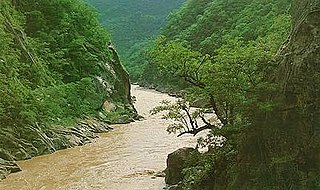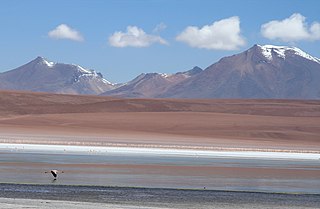Related Research Articles

Pilcomayo is a river in central South America. At 1,100 kilometres (680 mi) long, it is the longest western tributary of the Paraguay River. Its drainage basin is 270,000 square kilometres (100,000 sq mi) in area, and its mean discharge is 200 cubic metres per second (7,100 cu ft/s).

Capinota is one of sixteen provinces in the Cochabamba Department, Bolivia. Its capital is the city of Capinota. The province has a projected population over 33,000 inhabitants by 2017. Capinota has three sections and the most populous is Capinota section, followed by Santivanes.

Esteban Arze is a province in Cochabamba Department, Bolivia. Its capital is Tarata. Many people from the Esteban Arze province have migrated abroad,mainly to Argentina and to the Washington DC area https://pulitzercenter.org/reporting/only-bridge-matters-now

Mizque is a province in the Cochabamba Department, Bolivia. Its capital is Mizque.

Tomás Frías is a province in the northern parts of the Bolivian Potosí Department. Its capital is Potosí which is also the capital of the department. The province is named after the former president Tomás Frías Ametller.

Jaime Zudáñez is a province in the Bolivian department of Chuquisaca. It was named after Jaime de Zudáñez, emancipation leader born in Chuquisaca in 1772.

Nor Cinti is a province in the Bolivian department of Chuquisaca. Its capital is Camargo.
Carhuamayo is one of four districts of the Junín Province in Peru.

Pitumarca District is one of eight districts of the province Canchis in Peru.
The Santa Elena River is a river of Bolivia in the Chuquisaca Department, Nor Cinti Province, partly on the border of Inka Wasi Municipality and San Lucas Municipality. It is a right affluent of the upper Pillku Mayu.
Anzaldo Municipality is the second municipal section of the Esteban Arce Province in the Cochabamba Department, Bolivia. Its seat is Anzaldo. At the time of census 2001 the municipality had 9,126 inhabitants.
Capinota Municipality is the first municipal section of the Capinota Province in the Cochabamba Department, Bolivia. Its seat is Capinota.

Mizque Municipality is the first municipal section of the Mizque Province in the Cochabamba Department, Bolivia. Its seat is Mizque.

Colcha "K" Municipality is the first municipal section of the Nor Lípez Province in the Potosí Department in Bolivia. Its seat is Colcha "K" or Villa Martín.
Puka Mayu is a Bolivian river in the Potosí Department, Nor Lípez Province, Colcha "K" Municipality. It originates in the Cordillera de Lípez and empties into the Uyuni salt flat. The mouth lies west and south west of the town Uyuni and north east of the mouth of the Río Grande de Lípez.
Puka Mayu of Pukamayu may refer to:
Puka Pampa River is a Bolivian river in the Chuquisaca Department, Sud Cinti Province, Culpina Municipality. It is a left tributary of the Pilaya River, an important right affluent of the Pillku Mayu.
Puka Urqu is a mountain in the Andes of Peru, about 4,800 m (15,700 ft) high. It is situated in the Cusco Region, Canchis Province, Combapata District. Puka Urqu lies northwest of Inka Pirqa. The Llanqha Mayu flows along its slopes. It is a right affluent of the Willkanuta River.
Puka Qallpa is a 3,886-metre-high (12,749 ft) mountain in the Bolivian Andes. It is located in the Cochabamba Department, Mizque Province, Alalay Municipality. It lies in the northwest of Kachi Q'asa and northeast of Inka Pirqa. The Puka Urqu Mayu flows along its western slope. Its waters flow to the Jatun Mayu in the south.
Puka Urqu is a mountain in the Bolivian Andes which reaches a height of approximately 3,760 m (12,340 ft). It is located in the Potosí Department, Tomás Frías Province, Yocalla Municipality. Puka Urqu lies at the Ingenio Mayu north of Kunturiri.
References
- ↑ katari.org Aymara-Spanish Dictionary: Puka(adj.) - Rojo.Mayu(s.) - Río.
- ↑ Capinota Municipality: Archived 2013-11-05 at the Wayback Machine population data and map
